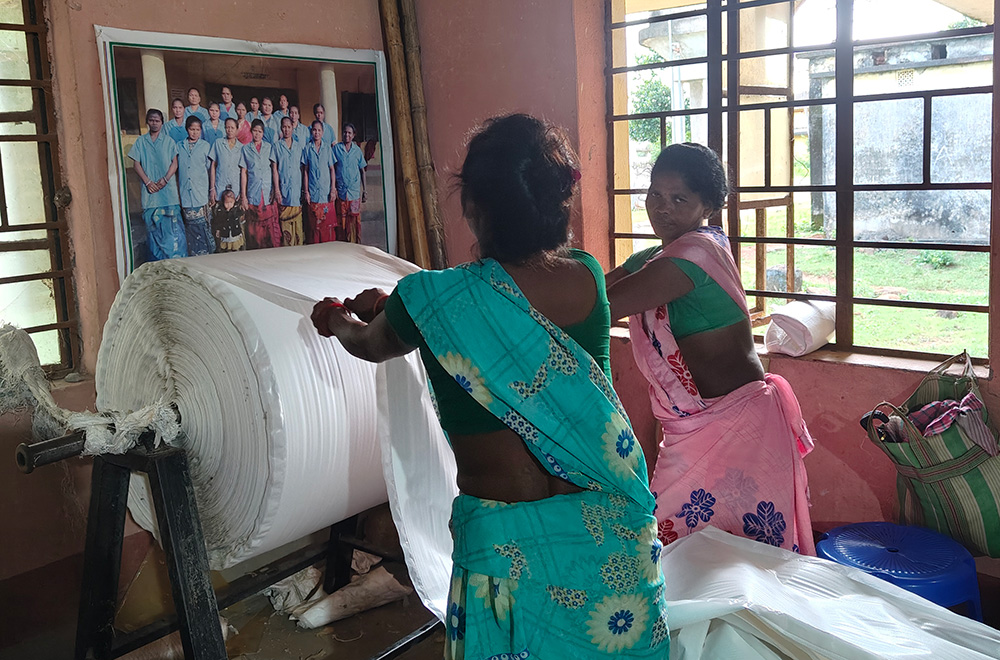
Across the forested highlands of Littipara in Jharkhand’s Pakur district, the Paharia people, a Particularly Vulnerable Tribal Group (PVTG) live close to the land but far from the mainstream. Over the years, the Paharia language grew quieter, festivals smaller, and youth migration more common. Public services reach them late, and with poor road links and little exposure to markets, families depend largely on subsistence farming. Most Paharia villages are remote and scattered across hilly terrain, where cultural norms restrict women’s mobility and their participation in income-generating work. These realities made it difficult for any initiative to take off, and many men doubted whether women could handle business or interact with officials.
Yet, amidst these barriers, Rubi Mahato, a young woman who had studied till the 12th grade saw possibility where others saw limits. For her, this was more than poverty; it was the slow fading of her people’s identity. She felt a deep urge to preserve what was slipping away, their skills, pride, and collective strength.
Rubi’s act to reclaim identity
Rubi’s memories are rooted in the rhythms of her village, women weaving baskets, men tilling small fields, and elders narrating stories that carried wisdom and belonging. But as time passes, these rhythms are fading. Young people sought wage work outside, and traditional craftwork found no buyers. Rubi realized that waiting for change was not enough; she had to start it. She believed that women, long seen only as homemakers, could be the center of economic renewal. What began as a small discussion among six women slowly became a plan to connect livelihoods with identity.
Littipara’s local context that shaped the challenge
In 2019, Rubi and her friends formed a women’s group and named it “Gutu Galang” meaning “thread swing” in Santhali. The name reflected both their material (jute) and their mission to generate livelihood opportunity for themselves. Supported by a 4.5 lakh seed grant from Mission Badlaav, they began producing jute bags, an eco-friendly alternative that also met local demand through schemes like Dakia Yojana. They learnt to source raw jute, stitch, and stamp each bag with their mark, a symbol of pride and authenticity.
The first months tested them. Training meant long walks to centers, buyers were hard to find, and families resisted the idea of women stepping out. But Rubi persisted, visiting homes, showing samples, and sharing small earnings. Gradually, doubt turned into belief. Families saw how the income supported food, medicines, and school needs.
Change that stitched a future
What started with six women has now grown to a network of fifty active producers and nearly 3,000 women linked through training, supply, and distribution. Women now earn between ₹15,000 and ₹18,000 a month, an amount that has changed their place in the household and
community. Husbands who once questioned the work now encourage it. Local buyers appreciate the quality and the story behind each bag, the mark of the Paharia.
Expanding the dream
As trustee of Gutu Galang, Rubi now leads the group with support from the Jharkhand State Livelihood Promotion Society (JSLPS), State Bank of India, and Mission Badlaav. The initiative is expanding into seed training and sustainable agriculture to diversify income sources. Rubi envisions a future where the Paharia name travels beyond Littipara, carried through every product that tells their story of resilience.
For Rubi and the women of Gutu Galang, every bag stitched is more than livelihood — it is identity made visible. Their journey shows that community-rooted ideas, when guided by women’s leadership and cultural pride, can revive traditions and create lasting change. In the hills of Littipara, the mark on each bag quietly declares: “We are here, and we will remain.”
TAGS
SHARE





